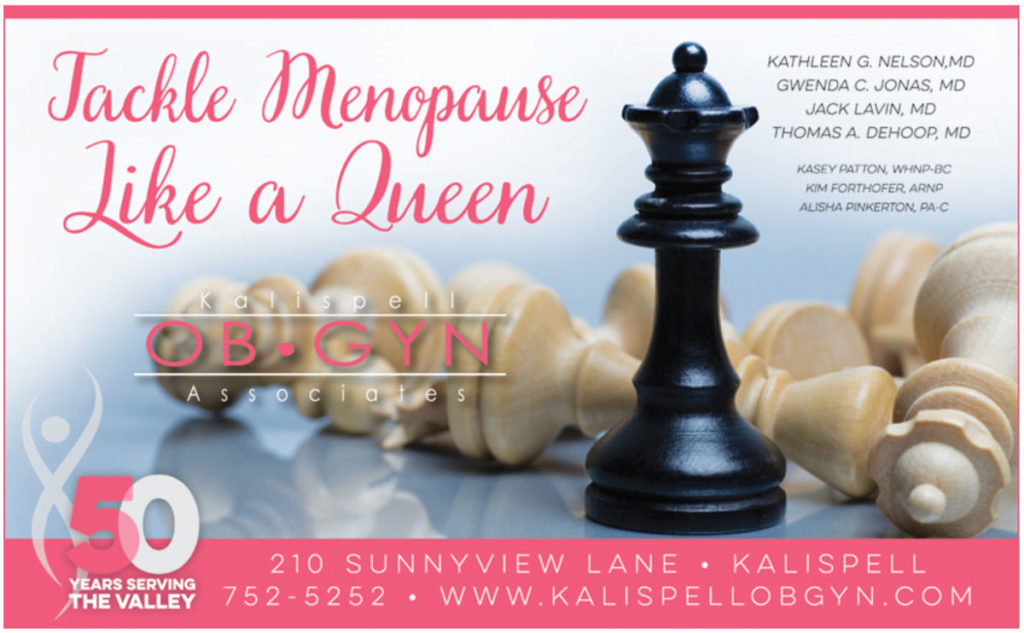Tackle Menopause Like A Queen
By Kimberly Forthofer, ARNP

Menopause, with the depletion in estrogen, is definined as the absence of menstrual periods for 12 months. The average age of menopause is 51, though changes in hormones or perimenopausal changes can begin several years prior to menopause. Changes associated with menopause include menstrual irregularities, hot flashes, vaginal dryness, sleep disturbances, weight change, sexual dysfunction and cognitive changes. The aforementioned list may provoke fear in even the most optimistic, but rest assured, not every woman’s menopausal transition is difficult! And thanks to our ever expanding understanding, menopausal symptoms can be managed with approaches ranging from simple lifestyle changes to innovative new drug therapies.
You’ve heard it before – You are what you eat!
Staying healthy by incorporating a low saturated fat and low calorie diet along with regular and mental changes associated with menopause. Coronary heart disease is the number one killer of women in the United States. Estrogen has been found to have some cardio-protective benefits within the small vessels of the heart, though the benefits of estrogen in women older than 50 has not been as clear. Therefore, estrogen replacement is not recommended to reduce risks of cardiovascular disease. Risk factors for heart attack and stroke include a family history of cardiovascular disease, being overweight or obese, smoking, high blood pressure, elevated blood glucose and cholesterol levels. Adhering to a Mediterranean Diet, which is high in vegetables, fruits, lean proteins and healthy oils, with minimal intake of red meat, along with regular exercise of at least 30-60 minutes most days of the week, can reduce the risk of heart disease. Additionally, healthy eating and exercise can improve mood and memory, help maintain a healthy weight and bone density and reduce hot flashes.
“It’s gettin’ hot in here”
You’ve layered your clothing, avoided spicy foods, hot drinks and even an evening night cap; you’ve been sleeping in a freezer and there is still no relief from hot flashes and night sweats! The most effective and reliable treatment of hot flashes remains hormone therapy. There are some risks associated with hormone therapy, which include breast cancer, endometrial cancer and coronary heart disease. However, these risks also increase with increasing age. When hormone therapy is started early, near menopause, the benefits outweigh the risks. The majority of women of younger age are appropriate candidates for hormone therapy, even if they have familial cancer risks. There are various delivery methods of hormone therapy including tablets, patches, creams/gels, and rings. Vaginal estrogen therapy, which will be discussed below, carries with it very minimal risk, whereas the remainder of methods are fairly equivalent in their cancer risks. However, transdermal estrogen may be more appropriate for individuals with high cholesterol or those at risk for liver disease. It is important to understand that bioidentical hormone therapy is no safer than other forms of hormone therapy. There are many formulations of bioidentical hormone therapy available in brand and generic names at retail pharmacies. Other pharmacologic non-hormonal therapies for hot flashes and night sweats include anti- depressants, anti-seizure medications and anti-hypertensives. Complimentary alternative therapies that have shown some benefits are black cohosh, isoflavones and phytoestrogens, which are available over-the-counter. Relaxation and stress management have also shown benefit.
Tonight’s NOT the Night
Nearly 50% of women will experience vaginal dryness and pain associated with the depletion in estrogen during and after the menopausal transition, leading to decreased libido, difficulty with orgasm and arousal, and pain with intercourse. There are a variety of over- the-counter lubricants available, but many women still suffer pain with intercourse along with additional difficulties of recurrent vaginal irritation, urinary tract infections, and incontinence. Vaginal estrogen, available in creams, gels, tablets and compounded formulations, is an effective and safe option for treatment. There is also a relatively new vaginal estrogen treatment in the form of an oral pill, Osphena. It is available for women who cannot tolerate vaginal estrogen preparations and is novel in that it is an oral tablet that works only on estrogen receptors in the vagina, thereby increasing vaginal lubrication. It is important to note vaginal estrogens and Osphena have no benefit in reduction of hot flashes associated with menopause.
Menopause carries with it a negative connotation and with this we do ourselves a disservice. Women may not readily identify the advantages of menopause such as the end of painful periods, PMS, and the unpredictability of periods. For other women, the fear of pregnancy is now removed and women and their partners can find greater sexual freedom. Women can also regain a renewed sense of self as they can now focus on their own needs. The menopausal transition should incite a woman to place attention back on her health and tackle the refinement head on, armed with understanding and confidence.
**Kimberley Forthofer, ARNP joined Kalispell OB/GYN in July of 2013. She was raised in Whitefish and returned to the Flathead Valley after working for 4 years as a primary care provider in Idaho. She offers a wide range of experience in primary care as well as women’s health and her clinical experience includes both acute and chronic care. She and her husband, Joe, have two children and have enjoyed getting back to the outdoor recreational opportunities that Montana offers.
